I received an article today about a fire at the Evelyn Gardens apartment complex in Albany, California, which resulted in $400,000 in damage and one fatality. In the article, Fire Chief Marc McGinn is quoted several times in regard to apartment entry doors. Here’s an excerpt:
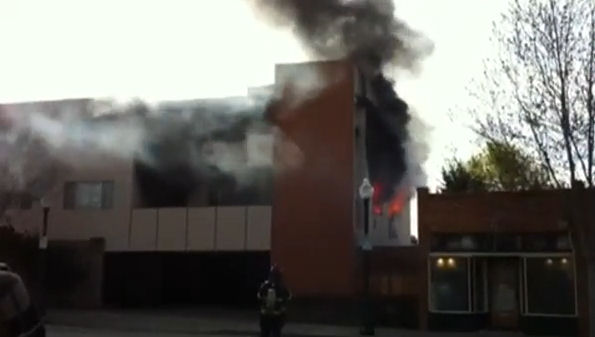 ” ‘Closing doors on fires can save lives,’ he said. ‘If there is a fire in your unit, and you must leave the premises, close the door. It confines the fire and starves it of oxygen. Closing the door behind you is the most important thing.’
” ‘Closing doors on fires can save lives,’ he said. ‘If there is a fire in your unit, and you must leave the premises, close the door. It confines the fire and starves it of oxygen. Closing the door behind you is the most important thing.’
A family fleeing the fire at Evelyn Gardens left the door open, which allowed the fire to spread from the second to the third floor, and engulf two hallways, said McGinn.
At least one other resident of the apartment complex passed the open door, saw the fire inside, and failed to close it, he added.
‘The most important thing you can ever remember about a fire, if it’s in your room, close that door,’ McGinn said. ‘Every door that you can close, you will confine that fire. Just by closing the door, it would have bought us 10 minutes. We need to get the message out to apartment owners about this.’
McGinn said the Albany Fire Department will be sending letters to apartment owners about closing doors, and other steps to take in case of fires, and is working with Gateview to ensure that every unit in the large complex has self-closing doors.”
Whenever I see a story like this, I consider it an opportunity to tell one more person about the requirement for annual fire door assembly inspections. The 2010 California Fire Code states that fire doors must be maintained in accordance with NFPA 80-2007, which requires the annual inspection as part of the fire door maintenance. I contacted Chief McGinn to discuss the requirement, and I followed up with more information as requested. He said that most fire departments are probably unaware of the inspection requirement. Who can blame them, really? It’s not specifically stated in the fire code…you have to go to the referenced standard to find out.
Those of us who look at doors on a daily basis know what kind of condition many fire and egress doors are in. The inspection requirements gives us a tool to help bring those doors into compliance. But we still have a very long way to go in our efforts to increase awareness. If you see an opportunity like this, advise the fire department about the value of annual fire door inspections. Or send me the information and I’ll be happy to do it. Fire doors hinder the spread of smoke and fire, but they can’t perform if they’re not properly maintained.
And because Chief McGinn was kind enough to hear me out regarding the stuff that I’m passionate about, I’ll share with you what he’s passionate about – photoelectric smoke detectors. You can learn more in this article from the San Francisco Chronicle.
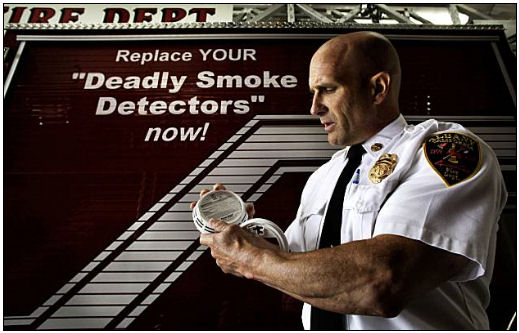
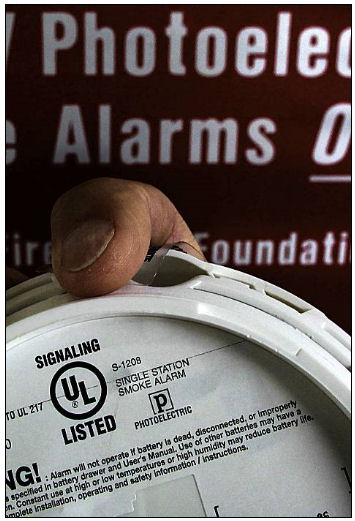
Photos: San Francisco Chronicle
I’ve checked my smoke detectors to make sure that they’re photoelectric detectors. Will you?
You need to login or register to bookmark/favorite this content.


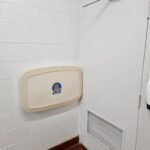

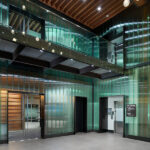
I checked my Kidde combo detector, and couldn’t tell, so I called them. Mine is Ionization, and I referred the technician to this page, because they were not aware of this.
Hi Jeff –
I gather that the ionization smoke detector manufacturers have defended their products but the aquarium test and the real-fire incidents and unfortunate deaths are enough to convince me.
– Lori
My main question about the fire in Albany is that if the entry doors were fire rated, why weren’t they self closing? People shouldn’t have to remember to close a door when they are running for their lives. As far as smoke detectors, I changed out all the detectors in my house last July when we moved in.
Hi Mike –
I talked to the chief about this and he said they have a lot of buildings built in the 50’s and 60’s, and that the doors weren’t self-closing. I don’t know if the codes required rated doors on apartments back then, so the doors may not be rated or they may have spring hinges that don’t work any more. I’d love to know when the codes started requiring rated doors on apartment entries…I’ll ask my code-expert pals on the discussion group and let you know if I find out.
Even when rated doors are installed on apartments, they’re often hung on spring hinges and after a while most of them don’t close completely or don’t close at all. There are apartment fires in the news ALL THE TIME. This is a great opportunity to talk to property managers about upgrading their doors to an inexpensive closer and having fire door inspections if applicable. Yes, there’s the initial expense of the closer/inspection, but in this case it might have saved a life and limited the damage to far less than $400,000 (+ the lost rental income). Eventually the insurance companies are going to realize that they’re paying out a lot more in claims than they need to.
– Lori
Aquarium test is not real life and a little deceiving IMO
Yes a combo detector is better
There’s another video from Barre, VT that’s in a real house. It’s hard to know what to believe but I’m not comfortable having only ionization type detectors, and I’m surprised I haven’t heard more about this before.
I will be changing out my smoke detectors in my home. $40 investment well worth the peace of mind in my eyes. We recently had a fire in my town that the home didn’t even have an operable smoke detector. Needless to say the couple lost (2) of their children in that fire. Very devastating to a community.
Hi James –
A fire marshal emailed me to say combination ionization/photoelectric detectors are the best because they will sound regardless of the type of fire. I have some of each type.
On the surface the combination ionization/photoelectric alarm sounds better. However, the Fire Marshal is incorrect. Please examine the facts:
http://www.theWFSF.org/combocon
Hi,
I am Marc McGinn the Fire Chief in Albany. Yes the combo will sound earlier because the photoelectric is the one detecting. The ionization part of the detector will still false alarm when cooking. The combination detectors are something the manufacturers are loving as they cost more but use cheaper parts to stay competitive. Go to http://www.theWFSF.org and view the Combo Con. Please review the videos also.
Sincerely,
Marc
Hi Chief McGinn –
Thank you for adding your input. I’ve had several emails about the videos…it’s hard to believe that this issue exists and the general public is unaware for the most part. I appreciate all your hard work to increase this awareness.
– Lori
Dear Lori
Thank you for creating this webpage. It is stunning that we have been on this campaign for over 10 years and the truth is still being withheld from most members of the American public and even our Firefighters. With billions of these deadly ionization devices sold, and tens of thousands of needless deaths, the last thing anyone wants to do is admit the truth. We have just uploaded a very powerful and damning letter which summarises the entire problem: http://www.theWFSF.org/legislation2
PLEASE read it and follow the links and you will be amazed and shocked.
Thank you for bringing this matter to the attention of your readers and please keep spreading the word.
Sincerely,
Adrian Butler
Chairman, The World Fire Safety Foundation
Queensland, Australia
Hi Adrian –
Thank you for your comment and the additional information. I am going to add a link in my sidebar so readers can access your site and this important information easily.
It is reading things like this that help me to educate family/friends and others in general which I hope saves someone down the line.